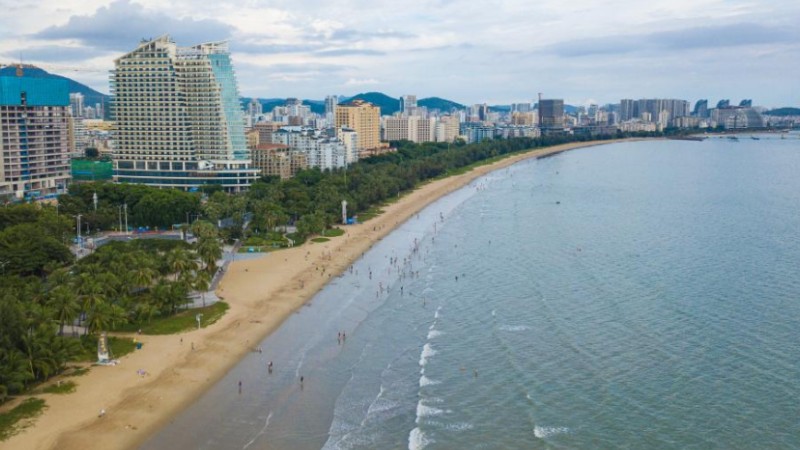Chinese premier aboard bullet train bound for Bandung, site of historic conference of third world
JAKARTA, Sept. 7 (Xinhua) -- Chinese Premier Li Qiang travelled aboard a bullet train on a trial run on Wednesday along the high speed railway connecting Indonesia's capital Jakarta and the country's cultural hub Bandung, site of the legendary Bandung Conference in 1955.
At the historical conference, dozens of Asian and African countries showed their collective strength behind independence amid a heightened Cold War between the United States and the Soviet Union. The China-proposed five principles of peaceful co-existence were expanded into ten principles, which helped breed one of the cornerstones of modern international relations.
When Li sat down with Southeast Asian leaders earlier in the day at the 26th China-ASEAN summit, he noted the five principles of peaceful co-existence. He said that China and ASEAN have been deepening practical cooperation in the traditional and non-traditional security fields, and have upheld the five principles of peaceful co-existence and the purpose of the Treaty of Amity and Cooperation in Southeast Asia (TAC).
In 2003, China officially joined TAC, setting the precedent for other non-ASEAN nations to follow and join the treaty. Established in 1976, the TAC embodies universal principles of peaceful coexistence and friendly cooperation among states in Southeast Asia.
The Chinese premier made a strong appeal that China and ASEAN must strive for regional peace and prosperity while properly handling disagreements and disputes.
China and ASEAN have succeeded in blazing a correct path of long-term good-neighborliness and friendship, as well as common development and prosperity as the world is undergoing profound changes unseen in a century, Li said.
At the 26th ASEAN Plus Three (APT) Summit, Li said the APT countries, and indeed all countries in Asia, share so many things in common.
They share a common home, common interests and common opportunities, Li said.
The Chinese premier also warned against a new Cold War. He said, "to keep differences under control, what is essential now is to oppose picking sides, oppose bloc confrontation, and oppose a new Cold War and to ensure that disagreements and disputes among countries are properly handled."
Disagreements and disputes may arise between countries due to misperceptions, diverging interests or external interferences, said the Chinese premier. Whatever the cause, it is vital to face the issue squarely, remove misunderstandings and keep the differences in check, he noted.
The most effective way to clear up misunderstandings is to strengthen exchanges, and increase mutual understanding and trust through sincere communication, said the Chinese premier.
China has always been committed to deepening exchanges and cooperation with regional nations. According to a list of China's cooperation initiatives for ASEAN summits, future cooperation between the two sides is going to include more innovation areas like digital technology, new energy vehicles, solar photovoltaic and artificial intelligence.
"China is committed to further enhancing trade partnership with the bloc," Joseph Matthews, a senior professor at the BELTEI International University in Phnom Penh, observed.
"China is also committed to sharing its digital and technological knowledge with the bloc, thus bringing the countries to par excellence in the area of economic development," he said.
The Bandung Conference held great significance because it served as a reflection of the discontent felt by Asian and African nations towards the Western powers' perceived lack of willingness to engage in meaningful consultations regarding matters that directly impacted them.
Developing countries in East Asia were striving for independence, self-improvement and overall development, said Zhai Kun, deputy dean of the Institute of Area Studies of Peking University.
A Bloomberg report said that Indonesia is welcoming investments in electric vehicle battery plants from China rather than begging from the United States.
"We can't keep begging and begging from you," Luhut Panjaitan, a senior Indonesian minister, said in May. "You may be angry at us for trading with other countries, but we have to survive."
The East Asia cooperation framework is a predecessor in Global South, said Zhai. "After over two decades of development, it has a relatively stable framework and solid foundation. It also accommodates developed countries such as Australia and New Zealand."
"In today's international landscape, development and security are still two pillars of the Asia-Pacific region," he noted. "How the Asia-Pacific sustains its growth and maintains regional stability will largely shape the development and security of the whole world."
Photos
Related Stories
- Premier Li calls for enhanced innovation cooperation among regional parties
- Chinese premier says opposing new Cold War essential
- Chinese premier calls for prioritizing development in regional cooperation
- China’s wisdom, energy, win-win mindset appreciated by Indonesian people, creates model for global cooperation: Chinese Ambassador to Indonesia
- Li urges Asia to focus on peaceful development
Copyright © 2023 People's Daily Online. All Rights Reserved.









